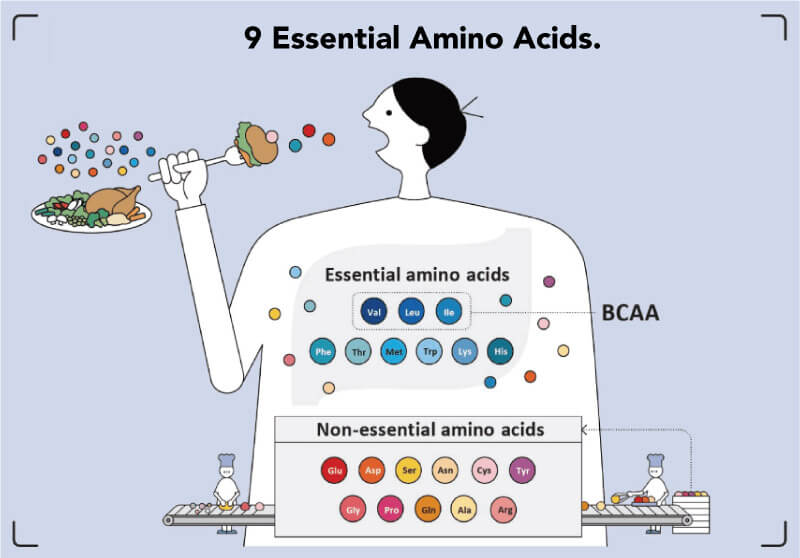Essential Amino Acids

Amino acids, often referred to as the building blocks of proteins, are compounds that play many critical roles in your body. You need them for vital processes such as building proteins, hormones, and neurotransmitters. Your body needs 20 different amino acids to grow and function properly. While all 20 of these are important for your health, there are 9 essentially classified amino acids. Although your body can make nonessential amino acids, it cannot make the 9 essential amino acids, so you have to get them from your food.
The best sources of essential amino acids are animal proteins such as meat, eggs, and poultry. However, some plant foods, such as the soy products edamame and tofu, contain all nine essential amino acids. This means they are “complete” sources of protein. After you eat 8 different types of protein, your body breaks it down into amino acids and then uses them for various processes, such as building muscle and regulating immune function. to complete add vegetables that incorporate the 13 essential vitamins.
What are the 3 essential branch chain amino acids (BCAA)?
The 3 essential amino acids are called branch chain amino acids – (BCAA). That means it has a chain branching off from one side of its molecular structure.
1) Valine helps stimulate muscle growth and regeneration and is involved in energy production.
2) Leucine is critical for protein synthesis and muscle repair. In addition to being a BCAA, this amino acid also helps regulate blood sugar levels, stimulates wound healing, and produces growth hormones.
3) Isoleucine is a branch chain amino acid and is involved in muscle metabolism and is heavily concentrated in muscle tissue. It’s also important for immune function, hemoglobin production, and energy regulation.
What are the 9 amino acids?
This is a complete list that includes the 3 essential amino acids + the 6 non-essential amino acids.
1) Histidine. Your body uses this amino acid to produce histamine, a neurotransmitter that is vital to immune response, digestion, sexual function, and sleep-wake cycles. It’s critical for maintaining the myelin sheath, a protective barrier that surrounds your nerve cells.
2) Isoleucine. The last of the three BCAAs, isoleucine is involved in muscle metabolism and is heavily concentrated in muscle tissue. It’s also important for immune function, hemoglobin production, and energy regulation.
3) Leucine. This BCAA that is critical for protein synthesis and muscle repair. It also helps regulate blood sugar levels, stimulates wound healing, and produces growth hormones.
4) Lysine. Lysine plays major roles in protein synthesis, calcium absorption, and the production of hormones and enzymes. It’s also important for energy production, immune function, and the production of collagen and elastin.
5) Methionine. This amino acid plays an important role in metabolism and detoxification. It’s also necessary for tissue growth and the absorption of zinc and selenium, minerals that are vital to your health.
6) Phenylalanine. Your body turns this amino acid into the neurotransmitters tyrosine, dopamine, epinephrine, and norepinephrine. It plays an integral role in the structure and function of proteins and enzymes and the production of other amino acids.
7) Threonine. This is a principal part of structural proteins, such as collagen and elastin, which are important components of your skin and connective tissue. It also plays a role in fat metabolism and immune function.
8) Tryptophan. Often associated with drowsiness, tryptophan is a precursor to serotonin, a neurotransmitter that regulates your appetite, sleep, and mood.
9) Valine. This is one of three branched-chain amino acids (BCAAs) on this list. That means it has a chain branching off from one side of its molecular structure. Valine helps stimulate muscle growth and regeneration and is involved in energy production.
The above list of the 9 essential amino acids can not be made by the body and have to come from food. For a healthy diet incorporate the 13 essential vitamins as well.
References:- National Library of Medicine
- Biochemistry Essential Amino Acids
- Explore Chemistry
- University of Hamburg Department of Biology: Storage Proteins
- University of Arizona Department of Biochemistry and Molecular Biophysics: Cell Signaling Problem Set
- Compound Summary